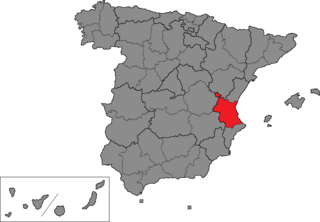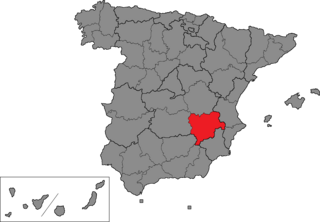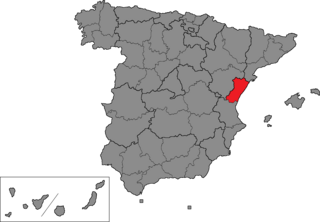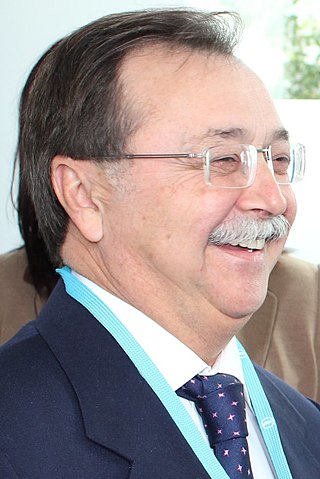
Valencia is one of the 52 constituencies represented in the Congress of Deputies, the lower chamber of the Spanish parliament, the Cortes Generales. The constituency currently elects 16 deputies. Its boundaries correspond to those of the Spanish province of Valencia. The electoral system uses the D'Hondt method and a closed-list proportional representation, with a minimum threshold of three percent.

Soria is one of the 52 constituencies represented in the Congress of Deputies, the lower chamber of the Spanish parliament, the Cortes Generales. The constituency currently elects two deputies. Its boundaries correspond to those of the Spanish province of Soria. The electoral system uses the D'Hondt method and a closed-list proportional representation, with a minimum threshold of three percent.

Barcelona is one of the 52 constituencies represented in the Congress of Deputies, the lower chamber of the Spanish parliament, the Cortes Generales. The constituency currently elects 32 deputies. Its boundaries correspond to those of the Spanish province of Barcelona. The electoral system uses the D'Hondt method and a closed-list proportional representation, with a minimum threshold of three percent.

León is one of the 52 constituencies represented in the Congress of Deputies, the lower chamber of the Spanish parliament, the Cortes Generales. The constituency currently elects four deputies. Its boundaries correspond to those of the Spanish province of León. The electoral system uses the D'Hondt method and a closed-list proportional representation, with a minimum threshold of three percent.

Melilla is one of the 52 constituencies represented in the Congress of Deputies, the lower chamber of the Spanish parliament, the Cortes Generales. The constituency currently elects one deputy using plurality voting. Its boundaries correspond to those of the autonomous city of Melilla.

Ceuta is one of the 52 constituencies represented in the Congress of Deputies, the lower chamber of the Spanish parliament, the Cortes Generales. The constituency currently elects one deputy using plurality voting. Its boundaries correspond to those of the autonomous city of Ceuta.

Albacete is one of the 52 constituencies represented in the Congress of Deputies, the lower chamber of the Spanish parliament, the Cortes Generales. The constituency currently elects four deputies. Its boundaries correspond to those of the Spanish province of Albacete. The electoral system uses the D'Hondt method and a closed-list proportional representation, with a minimum threshold of three percent.

Castellón is one of the 52 constituencies represented in the Congress of Deputies, the lower chamber of the Spanish parliament, the Cortes Generales. The constituency currently elects five deputies. Its boundaries correspond to those of the Spanish province of Castellón. The electoral system uses the D'Hondt method and a closed-list proportional representation, with a minimum threshold of three percent.

Lleida is one of the 52 constituencies represented in the Congress of Deputies, the lower chamber of the Spanish parliament, the Cortes Generales. The constituency currently elects four deputies. Its boundaries correspond to those of the Spanish province of Lleida. The electoral system uses the D'Hondt method and a closed-list proportional representation, with a minimum threshold of three percent.

The 2011 Ceuta Assembly election was held on Sunday, 22 May 2011, to elect the 5th Assembly of the Autonomous City of Ceuta. All 25 seats in the Assembly were up for election. The election was held simultaneously with regional elections in thirteen autonomous communities and local elections all throughout Spain.

The 1995 Ceuta Assembly election was held on Sunday, 28 May 1995, to elect the 1st Assembly of the Autonomous City of Ceuta. All 25 seats in the assembly were up for election. The election was held simultaneously with regional elections in thirteen autonomous communities and local elections all throughout Spain.

The 1999 Ceuta Assembly election was held on Sunday, 13 June 1999, to elect the 2nd Assembly of the Autonomous City of Ceuta. All 25 seats in the Assembly were up for election. The election was held simultaneously with regional elections in thirteen autonomous communities and local elections all throughout Spain, as well as the 1999 European Parliament election.

The 2003 Ceuta Assembly election was held on Sunday, 25 May 2003, to elect the 3rd Assembly of the Autonomous City of Ceuta. All 25 seats in the Assembly were up for election. The election was held simultaneously with regional elections in thirteen autonomous communities and local elections all throughout Spain.

The 2007 Ceuta Assembly election was held on Sunday, 27 May 2007, to elect the 4th Assembly of the Autonomous City of Ceuta. All 25 seats in the Assembly were up for election. The election was held simultaneously with regional elections in thirteen autonomous communities and local elections all throughout Spain.

The 2015 Melilla Assembly election was held on Sunday, 24 May 2015, to elect the 6th Assembly of the Autonomous City of Melilla. All 25 seats in the Assembly were up for election. The election was held simultaneously with regional elections in thirteen autonomous communities and local elections all throughout Spain.

The 2011 Melilla Assembly election was held on Sunday, 22 May 2011, to elect the 5th Assembly of the Autonomous City of Melilla. All 25 seats in the Assembly were up for election. The election was held simultaneously with regional elections in thirteen autonomous communities and local elections all throughout Spain.

The 2007 Melilla Assembly election was held on Sunday, 27 May 2007, to elect the 4th Assembly of the Autonomous City of Melilla. All 25 seats in the Assembly were up for election. The election was held simultaneously with regional elections in thirteen autonomous communities and local elections all throughout Spain.

The 2003 Melilla Assembly election was held on Sunday, 25 May 2003, to elect the 3rd Assembly of the Autonomous City of Melilla. All 25 seats in the Assembly were up for election. The election was held simultaneously with regional elections in thirteen autonomous communities and local elections all throughout Spain.
The 1995 Melilla Assembly election was held on Sunday, 28 May 1995, to elect the 1st Assembly of the Autonomous City of Melilla. All 25 seats in the Assembly were up for election. The election was held simultaneously with regional elections in thirteen autonomous communities and local elections all throughout Spain.

The 2019 Melilla Assembly election was held on Sunday, 26 May 2019, to elect the 7th Assembly of the Autonomous City of Melilla. All 25 seats in the Assembly were up for election. The election was held simultaneously with regional elections in thirteen autonomous communities and local elections all throughout Spain, as well as the 2019 European Parliament election.












